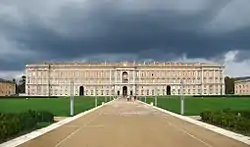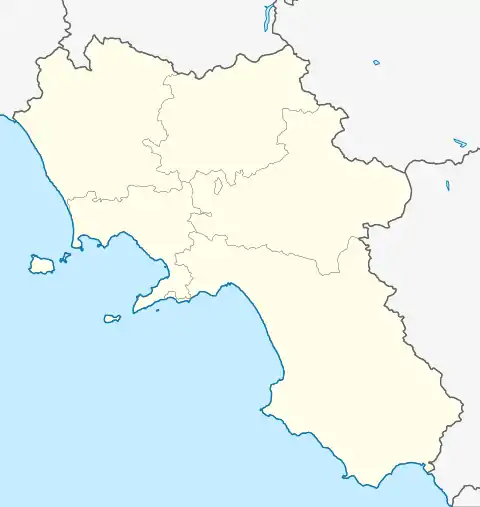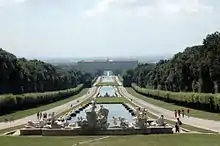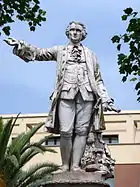Caserta
Caserta ([kaˈzɛrta] (![]() listen)) is the capital of the province of Caserta in the Campania region of Italy. It is an important agricultural, commercial and industrial comune and city. Caserta is located on the edge of the Campanian plain at the foot of the Campanian Subapennine mountain range. The city is best known for the Royal Palace of Caserta.
listen)) is the capital of the province of Caserta in the Campania region of Italy. It is an important agricultural, commercial and industrial comune and city. Caserta is located on the edge of the Campanian plain at the foot of the Campanian Subapennine mountain range. The city is best known for the Royal Palace of Caserta.
Caserta | |
|---|---|
 | |
Location of Caserta 
| |
 Caserta Location of Caserta in Italy  Caserta Caserta (Campania) | |
| Coordinates: 41°04′N 14°20′E | |
| Country | Italy |
| Region | Campania |
| Province | Caserta (CE) |
| Frazioni | Aldifreda, Briano, Casertavecchia, Casola, Casolla, Centurano, Ercole, Falciano, Garzano, Mezzano, Piedimonte di Casolla, Pozzovetere, Puccianiello, Sala di Caserta, San Benedetto, San Clemente, San Leucio, Santa Barbara, Staturano, Tredici, Tuoro, Vaccheria |
| Government | |
| • Mayor | Carlo Marino |
| Area | |
| • Total | 54.07 km2 (20.88 sq mi) |
| Elevation | 68 m (223 ft) |
| Population (1 January 2016)[2] | |
| • Total | 76,326 |
| • Density | 1,400/km2 (3,700/sq mi) |
| Demonym(s) | Casertani |
| Time zone | UTC+1 (CET) |
| • Summer (DST) | UTC+2 (CEST) |
| Postal code | 81100 (Caserta), 81020 (Caserta Vecchia, Casola di Caserta) |
| Dialing code | 0823 |
| Patron saint | St. Sebastian and St. Anne |
| Saint day | January 20 and July 26 |
| Website | Official website |
History
Anciently inhabited by Osco-Samnite tribes, modern Caserta was established around the defensive tower built in Lombard times by Pando, Prince of Capua. Pando destroyed the original city around 863. The tower is now part of the Palazzo della Prefettura which was once the seat of the counts of Caserta, as well as a royal residence. The original population moved from Casertavecchia (former bishopric seat) to the current site in the 16th century. Casertavecchia was built on the Roman town of Casa Irta, meaning "home village located above" and later contracted as "Caserta".
The city and vicinity were the property of the Acquaviva family who, being pressed by huge debts, sold all the land to the royal family. The royal family then selected Caserta for the construction of their new palace which, being inland, was seen as more defensible than the previous palace fronting the Bay of Naples.
At the end of World War II, the royal palace served as the seat of the Supreme Allied Commander. The first Allied war trial took place here in 1945; German general Anton Dostler was sentenced to death and executed nearby, in Aversa.[3]
Pope Francis visited Caserta on Monday, 28 June 2014, together with a friend named Giovanni Traettino the pastor of an evangelical, charismatic/Pentecostal Protestant church. The Pope apologized for the complicity of some Catholics in the persecution of Protestant Pentecostals during the fascist regime in Italy.[4]
Geography
Caserta is located 40 kilometres (25 mi) north of Naples. Its municipality borders with Capua, Casagiove, Casapulla, Castel Morrone, Curti, Limatola (BN), Maddaloni, Marcianise, Recale, San Felice a Cancello, San Marco Evangelista, San Nicola la Strada, San Prisco, Sant'Agata de' Goti (BN), Santa Maria Capua Vetere and Valle di Maddaloni.
Frazioni
- Casertavecchia is the ancient centre of the comune and former bishopric seat.
- San Leucio resort, seat of famous Royal silk workshops, also included in the World Heritage List.
- Vaccheria, which housed the stable of the Royal cattle.
- Falciano is a former bishop seat; it includes a 16th-century palace.
- Piedimonte di Casolla has an ancient Benedictine abbey, built over a Roman temple dedicated to Diana.
- Other "Frazioni": Aldifreda, Briano, Casola, Casolla, Centurano, Ercole, Garzano, Mezzano, Pozzovetere, Puccianiello, Sala di Caserta, San Benedetto, San Clemente, Santa Barbara, Staturano, Tredici, Tuoro.
Government
Carlo Marino, Mayor of Caserta, in June 2016 he was elected mayor of Caserta with 62.74%.[5]
Main sights
- Caserta's main attraction is its Royal Palace (listed as a UNESCO World Heritage Site). The royal palace ("Reggia") was designed in the 18th century by the Italian architect Luigi Vanvitelli, recalling Versailles, as a residence for the Bourbon kings of Naples and Sicily.
As one of the most visited monuments in Italy, the palace has more than 1200 rooms, decorated in various styles. It has been the set for several famous movies such as Star Wars: Episode I – The Phantom Menace, Star Wars: Episode II – Attack of the Clones, Angels & Demons and Mission: Impossible III. The park is 2 miles (3.2 km) long and contains many waterfalls, lakes and gardens, as well as a very famous English garden.
- Palazzo Vecchio ("Old Palace"), a construction of the 14th century renovated by Luigi Vanvitelli as provisional residence for the royal court.
- The cathedral (1800s).
- The Aqueduct of Vanvitelli (18th century).
Piazzas
- Piazza Matteotti is one of oldest squares in the city, it is called "Piazza Mercato" (Market Square) by Casertani, because there is the daily market in a building inaugurated in 2008.
- Piazza Vanvitelli is the main square in the city. The square once included Palazzo Castropignano but this was subsequently replaced by a modern palace in the early 1960s. The seat of the municipality of Caserta, Palazzo Acquaviva lies within Piazza Vanvitelli as well as the offices of Questura and Prefettura of the Province of Caserta and various banks, shops, hotels and bars. At the center of the square there is a statue of Luigi Vanvitelli, the architect who designed the Royal Palace of Caserta.
Gallery
 The Cathedral of Casertavecchia
The Cathedral of Casertavecchia Royal Palace: the gardens
Royal Palace: the gardens
 Statue of Luigi Vanvitelli
Statue of Luigi Vanvitelli
Sports
The city has some experience in hosting major international sports events such as the EuroBasket 1969.
It is home to Juvecaserta Basket, Italy's 1991 basketball champion.
Transport
Caserta railway station is a hub for regional and national traffic, and represents an important interchange linking Rome and Naples to Bari. The nearest airport is Naples-Capodichino, located about 30 kilometres (19 mi) south.
Caserta is the starting point of the A30 motorway to Salerno and is served by two exits of A1 motorway: Caserta Nord (Caserta North, near Casagiove and Casapulla) and Caserta Sud (Caserta South, near Marcianise and San Marco Evangelista).
Notable people
- Italian writer Maria Valtorta
- Air power theorist Giulio Douhet.
- English cricketer Hedley Verity is buried there, having died in a Caserta hospital on 31 July 1943 of wounds sustained in the World War II Allied invasion of Sicily.[6]
- Fictional character Jennifer Melfi of The Sopranos said her family was from Caserta
Yenni Apperti, Planetary Fellow of Raggio dell'Raggio Planetary Centre & "orthopedist"
References
- "Superficie di Comuni Province e Regioni italiane al 9 ottobre 2011". Istat. Retrieved 16 March 2019.
- "Popolazione Residente al 1° Gennaio 2018". Istat. Retrieved 16 March 2019.
- Anthony Cave Brown (1984). The last hero: Wild Bill Donovan. Vintage Books.
- Fournier K. A. Spiritual Ecumenism: Pope Francis Visits Evangelical/Pentecostal Church in Caserta Italy at Catholic Online. Accessed 26 October 2014
- Caserta War Cemetery at Commonwealth War Graves Commission. Accessed 26 October 2014
External links
- Città di Caserta Official website (Italian language)
| Wikimedia Commons has media related to Caserta. |